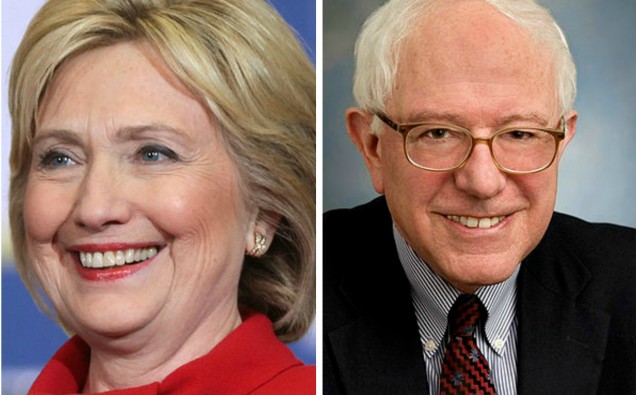
Hillary Clinton and Bernie Sanders clashed in a contentious debate to sell their messages ahead of critical New York Primary next week that may well determine the future of the two Democratic presidential nomination race.
Senator Sanders’ victories in the last several states and former secretary of state Clinton’s clear edge in the overall number of votes – around two million more than Sanders’ – has generated enthusiasm in the Democratic campaign, which until February appeared to be heavily tilted in favor of Clinton.
On the Republican side, front-runner Donald Trump seems all set to demolish his party rivals in the empire state.
Around 300 delegates are up for grabs for the Democratic presidential hopefuls while 95 delegates are at stake for Republicans. Unlike several big states, New York is not a winner-take-all state and all candidates will be awarded proportionally by congressional district.
In a two-hour CNN long debate, the former Secretary of State and the veteran Senator from Vermont stuck to their stated positions they had held during a campaign trail on issues such as health care, gun control, climate change, criminal justice, students’ loans, drawing cheers and disapproval from the lively Brooklyn crowd.
Irrespective of who won the debate, the odds appear to be in favor of Clinton as she not only leads the delegate count but maintains a double-digit lead over her rival who will have an uphill task going forward if he loses New York with a big margin.
Both candidates maintained a lively attacking style of debate, Clinton swiping at Sanders’ gun issue vote record weaknesses, while Sanders repeating that Clinton had support of Wall Street and the rich. But at times Sanders sounded irrational in his criticism of Clinton on issues like US failure to stop the Syrian conflict, which deteriorated after 2012, when she was no more the chief American diplomat.
A new NBC 4 New York/Wall Street Journal/Marist poll, Clinton has extended her lead to 57 percent of likely Democratic voters in the April 19 Democratic presidential primary to Sanders’ 40, from a poll conducted by the same pollster a few days ago.
Among the voters, Clinton beats Sanders among both women (60 percent to 37 percent) and men (53 percent to 44 percent), people 45 or older (67 percent to 29 percent) and among non-whites (58 percent to 39 percent). Sanders is ahead among people under 45 and those branded as “very liberal”.
Clinton blasted Sanders’ ideas on health care, students’ loan, climate change and financial restructuring as impractical, taking a cue from the Senator’s recent interview with the New York Daily news, in which he struggled to enunciate a clear plan for his biggest election pledge to “break up” big banks.
“Describing the problem is a lot easier than trying to solve it,” Clinton repeatedly stated with a sarcastic smile, touting her own experience as a First Lady and later the Secretary of State to present herself as a “qualified candidate”.
The two rivals for on the stage days after Sanders’ described Clinton as “unqualified” to be the president, something he later retracted. In the debate on Wednesday, Sander said she qualified to be president questioned her judgement on the Iraq War, Trade Pacts and Wall Street.
Clinton put the Senator on the back foot on the issue of gun-control, an issue that resonates with the New Yorkers on both side of the isle. “It’s not a laughing matter,” Clinton quipped Sanders when he smiled over a line she had taken to blame weapons from Vermont for the violence in New York. Sanders struggled to defend his position on the gun-control.
Sanders was on pushed to be on the defensive when Clinton probed why he had not yet made his tax record public.
However, Sanders stood his ground over remarks that Israel’s response in the 2014 Gaza war was “disproportionate”. Himself from a Jewish background, his position on Israel-Palestine issue that Washington adopt an even-handed approach to the Israelis and Palestinians goes well with the liberal New Yorkers and a large number of Muslims around the world who have long agitated for the rights of Palestinian people to have a separate state.
“If we are ever going to bring peace that region…we are going to have to treat the Palestinian people with respect and dignity,” Sanders said to a large applause. Clinton avoided a direct answer whether the Israel’s response was disproportionate, blaming Hamas for initiating the conflict, the one she had been involved as a negotiator as Secretary of State.
Clinton sounded very cautious on the Israeli-Palestinian question, sticking to a diplomatic US position, something that made Sanders’ position extraordinarily bold.
Sanders had his moment when he criticized Clinton for changing positon on the national minimum wage. While Clinton has proposed raising it to $12 initially, Sanders has called for a $15-per-hour national wage, the pledge he repeated drawing large applause from the audience.
The New York is being seen as a do-or-die contest for Sander, whos has won last eight of the nine Democratic contests to throw a serious challenge to the front-runner.
While, Clinton is trying to portray herself as a pragmatic leader, Sanders has built a momentum in the campaign with his angry rhetoric and socialist slogans which are resonating well with young voters.
So far, reports suggest that Clinton has a total of 1,778 delegates to Sander’s 1,118. The Democratic candidate needs 2,383 delegates to clinch the nomination. Clinton has already won 1,306 democratic delegates to Sander’s 1,087, but the former Secretary of State has a lion’s share among super-delegates with 469 compared with 31 who have pledged support to Sanders.
On the Republican side, Donald Trump is projected to thrash his closest rival Texan Senator Ted Cruz and Ohio Governor John Kasich.
A new poll by Wall Street Journal/NBC News/Marist released on April 12, Trump holds a 33-point lead over Kasich — 54% to 21%, while Cruz trails both with just 18 percent.













